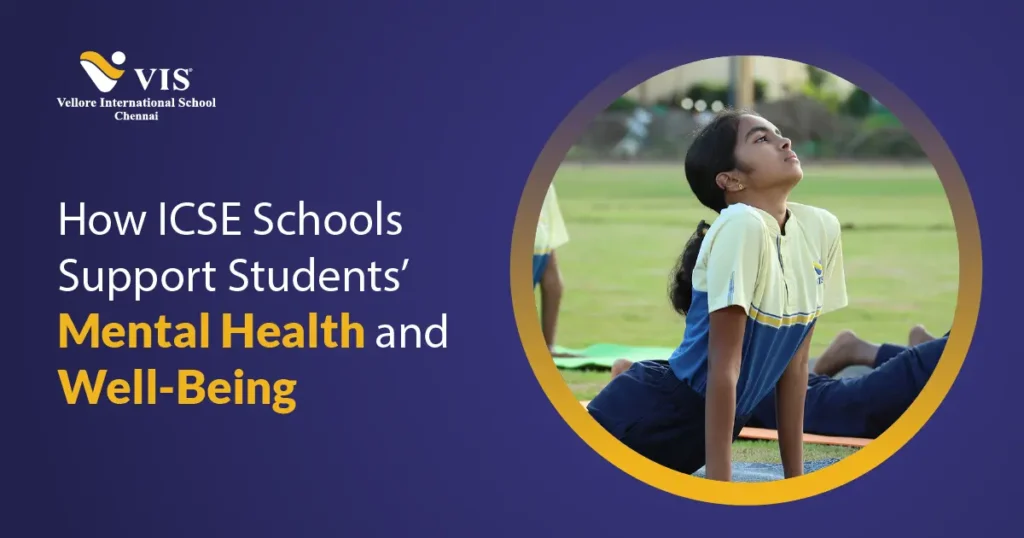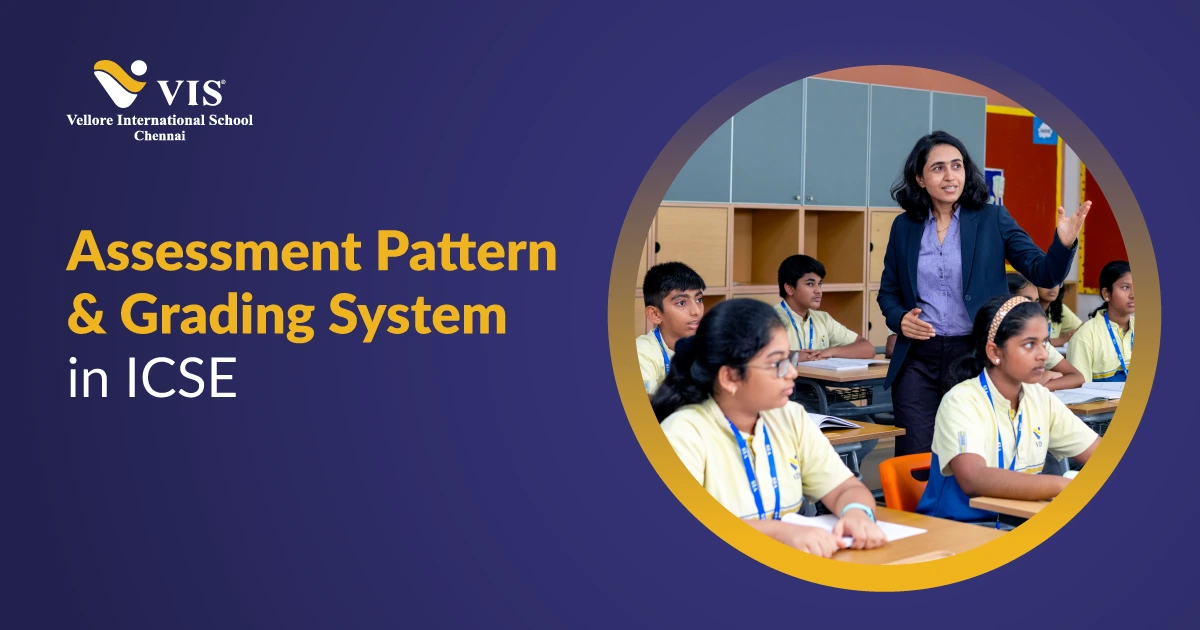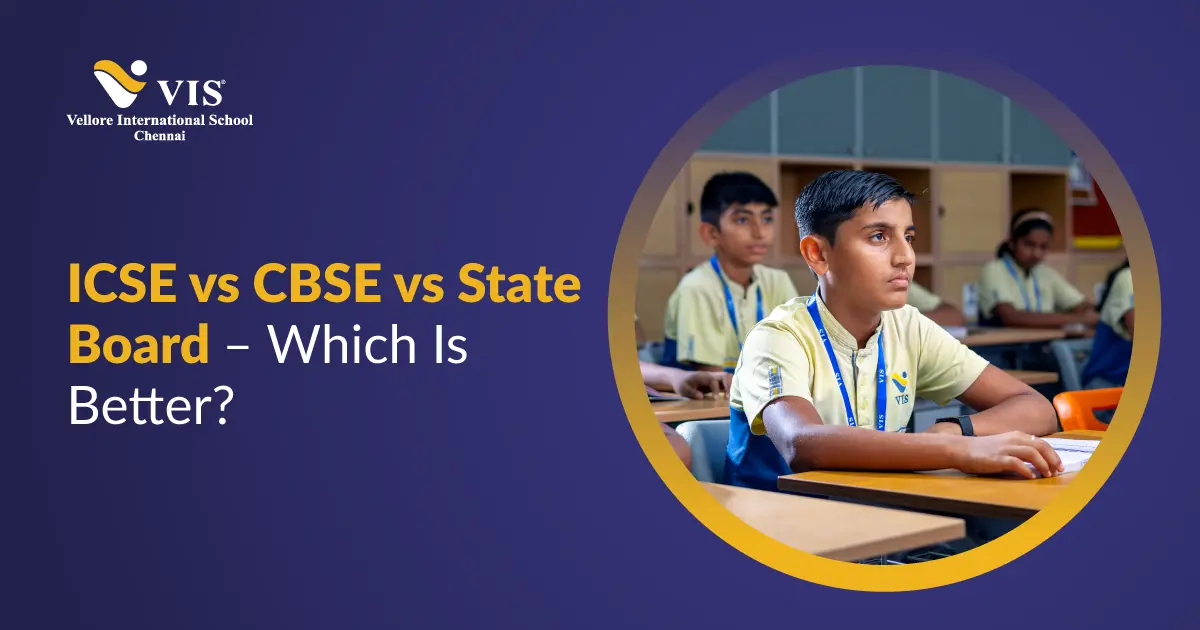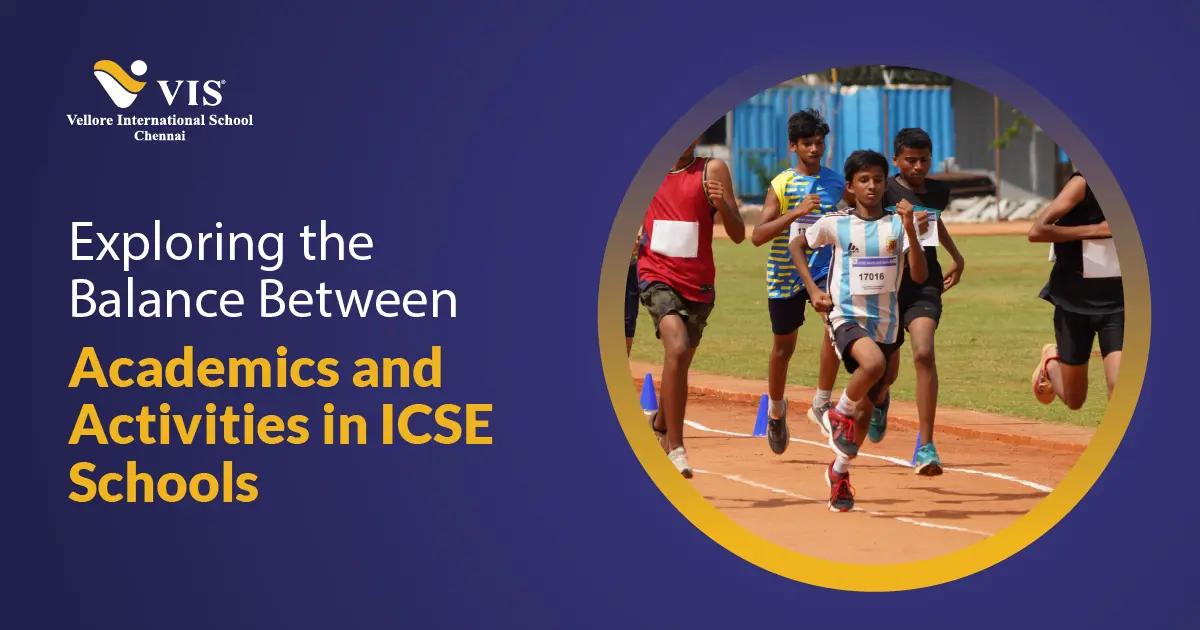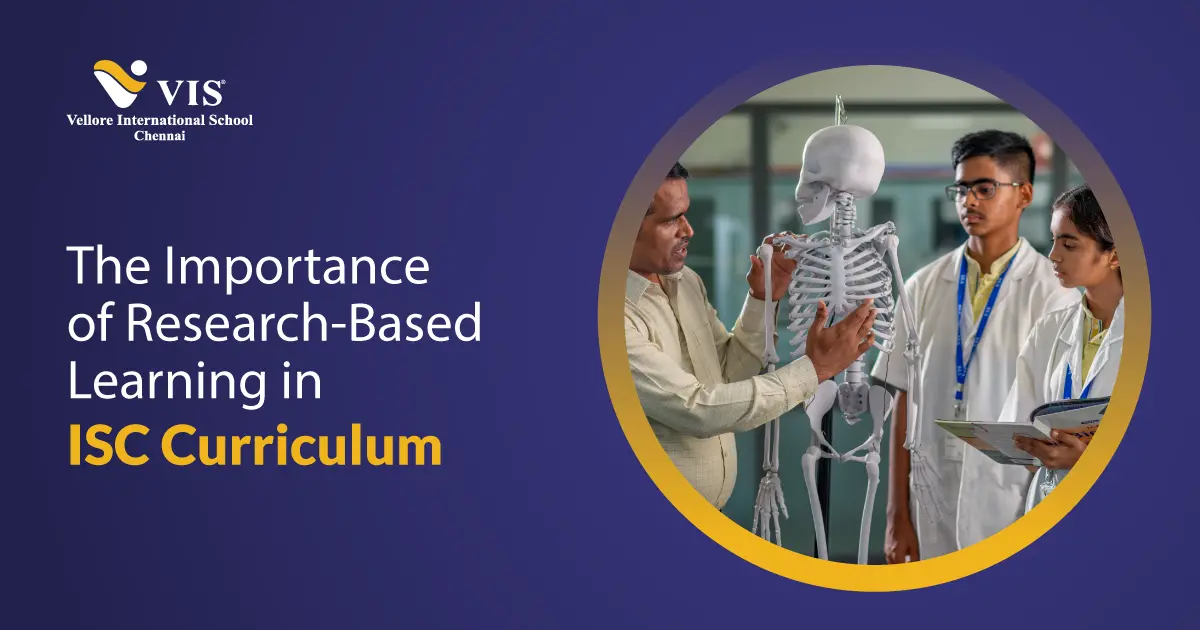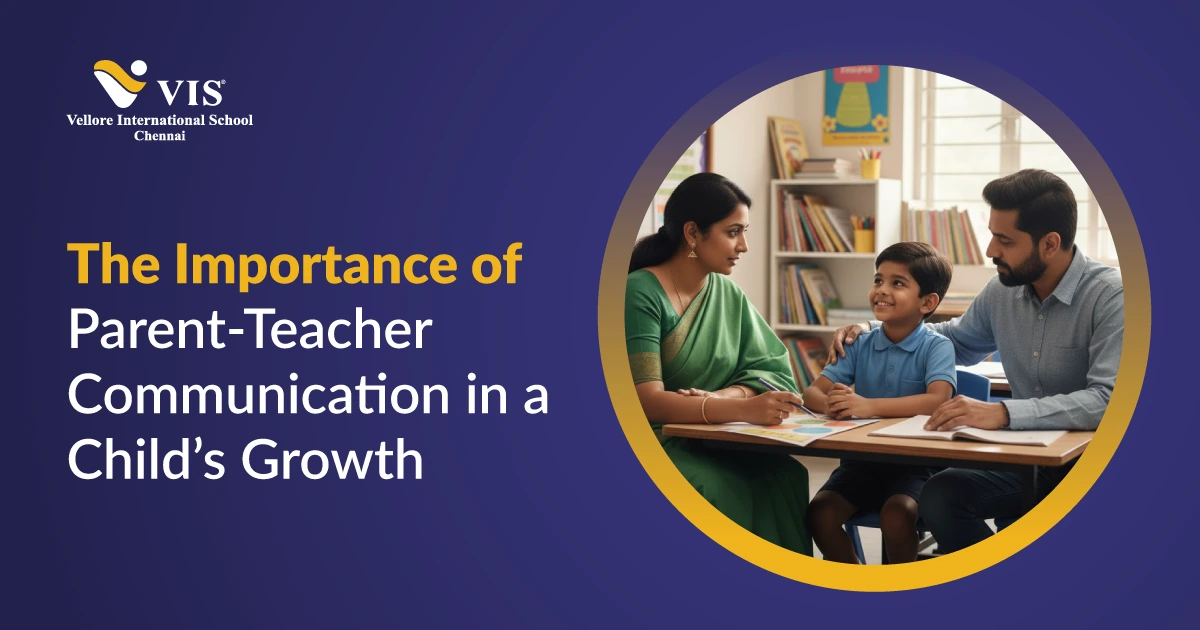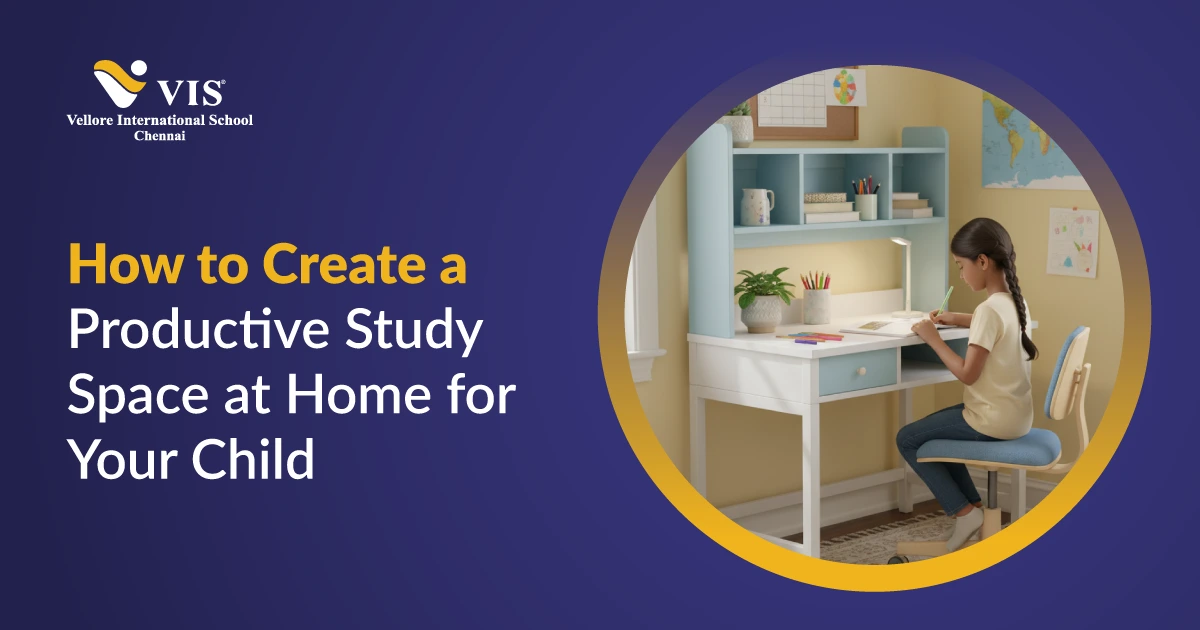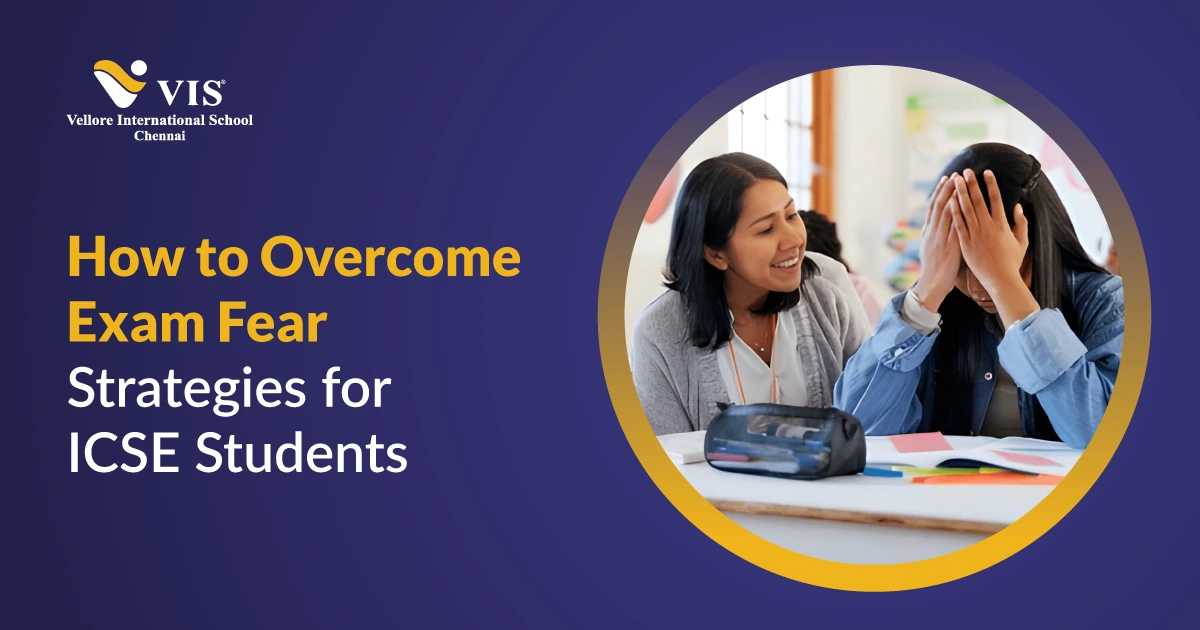Where do young minds find a balance between academic success and emotional wellness? Why is mental health an important pillar of holistic education today? The answers lie in how schools nurture the intellect and the emotional and psychological fabric of their students.
In this blog, we explore how ICSE schools support students mental health and well-being, how they differ in their approach, and why this matters more than ever
The Growing Need to Focus on Students Mental Health and Well-Being
According to a 2023 UNICEF India report, one in every seven adolescents in India aged 10 – 19 suffers from some form of mental health issue. Anxiety, depression, peer pressure, exam stress, social media influence, and even family expectations play a significant role in shaping their emotional states.
ICSE (Indian Certificate of Secondary Education) schools are aware of this. With their focus on overall development, many ICSE institutions have taken structured, proactive steps to ensure that the learning environment supports academic excellence and emotional resilience as well.
What Makes ICSE Schools Unique in Their Approach?
The ICSE curriculum is renowned for its balanced, comprehensive structure. Unlike some other boards that lean heavily on rote learning, ICSE promotes conceptual understanding, creativity, and application. But there’s another dimension that deserves equal attention: student centric values and support systems.
Here’s how ICSE schools create an ecosystem that nurtures students mental health and well-being:
1. Smaller Class Sizes for Better Teacher – Student Interaction
ICSE schools often maintain smaller student – teacher ratios, which builds closer bonds and personalised attention. Teachers are more likely to notice emotional or behavioural changes in students, making early intervention possible.
For example, if a student seems withdrawn or anxious, a teacher can gently explore what’s going on and recommend counselling before the issue escalates.
2. Focus on Co-Curricular and Extra Curricular Activities
Academic pressure is a leading cause of stress in students. ICSE’s strong co-curricular framework encourages participation in sports, music, art, drama, and debate, allowing students to explore diverse interests and express emotions creatively.
These outlets play a crucial role in reducing stress and supporting students mental health and well-being.
3. Continuous Evaluation Reduces Exam Stress
ICSE’s internal assessments and project-based learning offer a less stressful evaluation process compared to one-shot exams. The focus on continuous evaluation helps reduce the intense pressure of “performing on one day” and promotes consistent learning and growth.
Less pressure translates to improved mental health and well-being for students.
Mental Health Initiatives in ICSE Schools
Over the last decade, mental health has moved from being a taboo to a top priority in Indian education. Many ICSE schools have taken specific steps to promote students mental health and well-being. Here are some examples:
1. On-Campus Counselling Services
Several ICSE schools now employ trained counsellors who provide one-on-one sessions to students dealing with anxiety, depression, bullying, academic stress, or personal issues.
These safe spaces allow students to express themselves without judgment, helping them build emotional resilience.
2. Workshops and Awareness Campaigns
Mental health awareness is regularly promoted through interactive workshops, panel discussions, and wellness weeks. These sessions cover topics like:
- How to handle exam stress
- Managing screen time
- Dealing with peer pressure
- Understanding emotions
- Mental health first-aid for students and teachers
By normalising conversations around emotions, these schools support a culture of psychological openness.
3. Teacher Sensitisation and Training
ICSE schools regularly conduct teacher training programs on identifying emotional red flags, handling sensitive issues, and creating inclusive classroom environments. Empowering teachers with this knowledge ensures that students mental health and well-being are protected at every touchpoint.
Role of Peer Support and Mentorship
Adolescents often feel more comfortable opening up to their peers than adults. Recognising this, ICSE schools promote peer mentorship and buddy programs, especially for:
- New students adjusting to the school culture
- Students preparing for board exams
- Those dealing with family transitions or emotional instability
Mentorship and peer support systems build trust, confidence, and community
School Infrastructure and Safe Environment
Physical environment plays a surprising role in students mental health and well-being. ICSE schools often invest in:
- Spacious, well-ventilated classrooms
- Green campuses
- Peaceful reading zones and meditation rooms
- Counselling rooms are designed for privacy and comfort
These calm, stress free environments subtly promote relaxation and emotional safety.
Involving Parents in the Mental Health Journey
ICSE schools recognise that mental health is a collaborative effort. Students don’t exist in isolation – what happens at home affects how they feel at school, and vice versa. Many schools conduct parent orientation programs that educate guardians about:
- Recognising signs of mental distress
- Maintaining healthy communication with teenagers
- Avoiding comparison and unrealistic expectations
- Encouraging open emotional dialogue at home
The Role of Technology in Mental Health Support
Modern ICSE schools are also leveraging technology for mental health. Mobile apps, anonymous feedback systems, and digital journaling platforms allow students to:
- Monitor their mood
- Request private counselling
- Access motivational content and calming audio
- Reflect on their emotional triggers
EdTech tools also provide real-time insights for school authorities to identify patterns and take proactive measures to improve students mental health and well-being.
Addressing Bullying and Cyber-Safety
Bullying, both in person and online, remains a threat to mental health. ICSE schools adopt a zero tolerance policy for bullying and harassment. Students are taught the importance of:
- Digital citizenship
- Respect for diversity
- Reporting mechanisms
- Empathy and conflict resolution
Life Skills and Emotional Intelligence Programs
Mental health is about promoting strength. That’s why ICSE schools embed life skills education into their curriculum. Students learn:
- Emotional self-regulation
- Active listening and communication
- Resilience and adaptability
- Problem-solving and decision-making
These life tools go a long way in boosting students mental health and well-being, preparing them for the challenges of higher education and life beyond school.
Vellore International School: A Winner of Mental Wellness
Vellore International School (VIS), an esteemed ICSE institution in Chennai, is deeply committed to supporting students mental health and well-being as part of its mission to create responsible global citizens.
With a lush green campus and a progressive academic structure, we understand that emotional health is foundational to academic success. Here’s how VIS integrates mental health into everyday learning:
1. Safe, Inclusive, and Respectful Environment
VIS cultivates a school culture where every student feels valued, heard, and respected. From peer-led initiatives to teacher mentorship, VIS students have access to various emotional support systems.
2. Mental Health Counselling and Guidance
The school has trained counsellors who provide confidential support sessions, helping students with anxiety, stress, or any emotional struggles. These sessions are voluntary, stigma-free, and empowering.
3. Mindfulness and Wellness Programs
VIS also includes mindfulness, yoga, and guided breathing exercises as part of its health curriculum. These activities improve focus, reduce anxiety, and equip students with lifelong coping skills.
Final Thoughts:
Why should we care about how schools manage mental health? Because a student who feels emotionally safe is more likely to thrive, explore, and achieve. ICSE schools, with their student philosophy, have emerged as pioneers in supporting students mental health and well-being.
By blending academics with emotional intelligence, ICSE schools are raising successful students and well-rounded individuals ready to lead with empathy and confidence. In a world where pressure is rising and childhood is shrinking, schools that care about students mental health and well-being are shaping a more compassionate future.
FAQs:
1. Why is students’ mental health and well-being important in schools?
Students’ mental health and well-being are essential for their academic performance, emotional development, and social skills. Schools that support mental wellness help students manage stress, build confidence, and thrive in both academics and life. ICSE schools integrate these practices into everyday learning, making emotional wellness a priority.
2. How do ICSE schools help students cope with exam stress and anxiety?
ICSE schools adopt a balanced approach with continuous assessments, project-based learning, and a strong focus on co-curricular activities. Many schools offer on-campus counselling, mindfulness sessions, and peer mentoring programs that help students handle academic pressure and reduce exam related anxiety.
3. What programs are available in ICSE schools to support students’ emotional well-being?
ICSE schools often provide dedicated mental health counselling, wellness workshops, life skills training, yoga, and mindfulness programs. These initiatives are designed to nurture emotional intelligence, build resilience, and create a supportive environment for students’ mental health and well-being.
4. How can parents collaborate with ICSE schools to support their child’s mental health?
Parents can participate in school-led mental health awareness sessions, maintain open communication with teachers and counsellors, and create a supportive home environment. ICSE schools like Vellore International School involve parents in the emotional development journey through regular workshops and feedback systems.
5. What makes Vellore International School (VIS) different in promoting students mental health and well-being?
Vellore International School offers a holistic ICSE education with strong emphasis on mental wellness. With trained counsellors, mindfulness programs, and inclusive classroom environments, VIS ensures students receive the emotional support they need to excel in academics and life.

